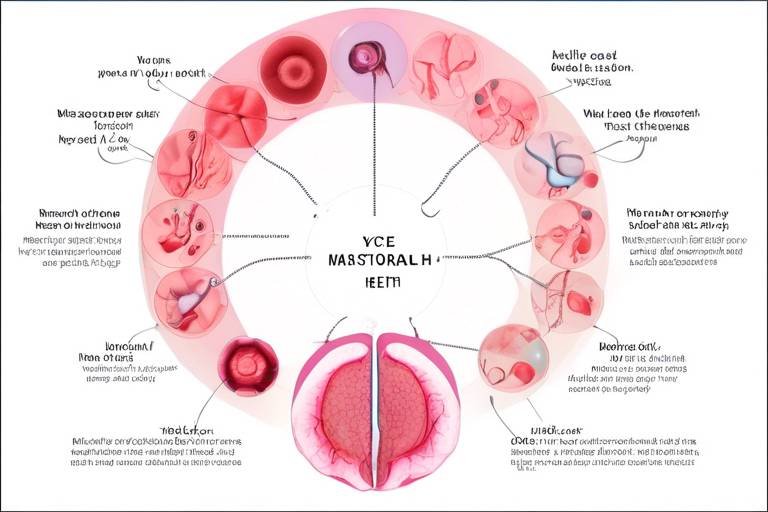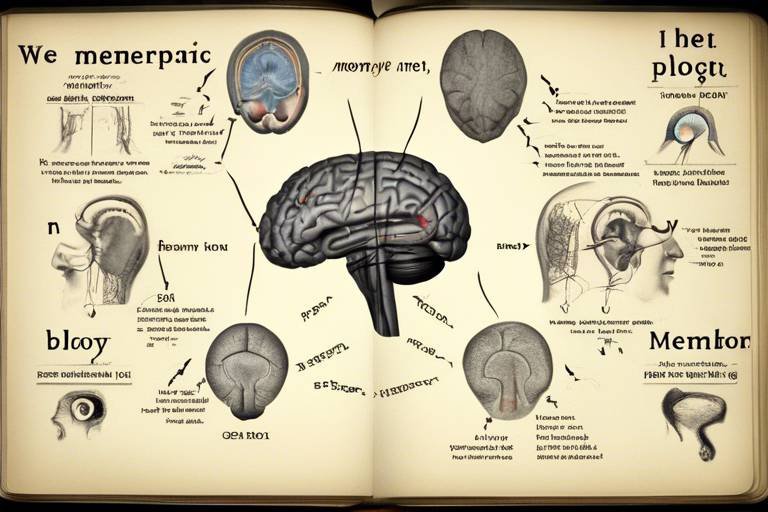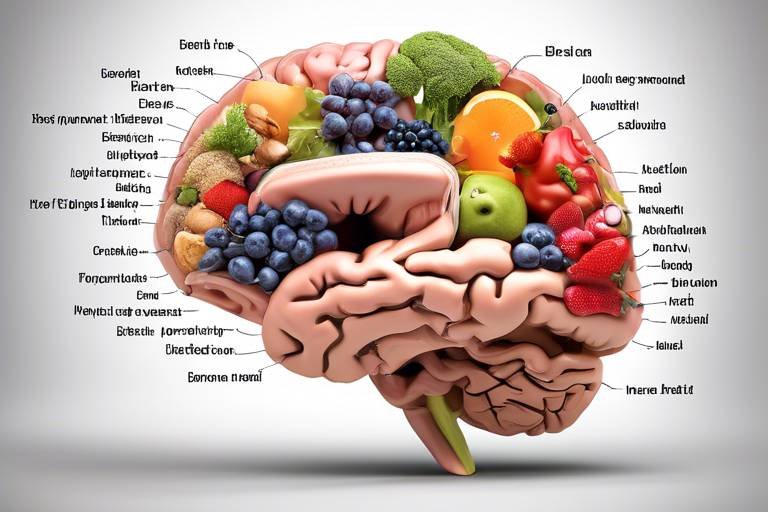The Science of Self-Care - Why It Matters
In today's fast-paced world, the concept of self-care has gained immense popularity, and for a good reason. It's not just a buzzword; it's a vital component of maintaining a balanced and fulfilling life. Self-care encompasses a range of activities that promote physical, mental, and emotional well-being. Think of it as your personal maintenance routine—just like a car needs regular oil changes and tire rotations, your mind and body require consistent care to function optimally.
Research has shown that engaging in self-care can lead to profound benefits. For instance, studies indicate that individuals who prioritize self-care experience lower levels of stress and anxiety. This is because self-care practices can help to recharge your mental batteries, allowing you to face daily challenges with a fresh perspective. Furthermore, self-care is not merely about indulging in spa days or luxurious treatments; it involves making conscious choices that enhance your overall health and happiness.
Understanding the importance of self-care can serve as a powerful motivator. When you recognize that taking time for yourself is crucial for your well-being, it becomes easier to incorporate self-care into your daily routine. This article will delve into the various dimensions of self-care, examining its impact on health and well-being. Whether you’re a busy professional, a parent juggling multiple responsibilities, or simply someone seeking more balance in life, the science of self-care is relevant to you.
So why does self-care matter? Here are a few key reasons:
- Enhances Mental Health: Regular self-care practices can significantly reduce symptoms of anxiety and depression.
- Boosts Physical Health: Engaging in physical self-care activities, like exercise and proper nutrition, leads to better overall health.
- Improves Emotional Resilience: By taking care of yourself, you build a stronger foundation to handle life’s ups and downs.
In essence, self-care is not a luxury; it's a necessity. By prioritizing self-care, you're not only investing in your own health but also setting a positive example for those around you. In the following sections, we will explore the psychological benefits of self-care, the role of mindfulness, and how to overcome common barriers that prevent individuals from fully embracing self-care. So, buckle up, because understanding the science behind self-care could be the key to unlocking a healthier, happier you!
Understanding why self-care is crucial for overall well-being can motivate individuals to take action. This section delves into the various dimensions of self-care and its impact on health.
Self-care plays a significant role in mental health. This section discusses how engaging in self-care practices can reduce stress, anxiety, and depression, leading to improved emotional resilience.
Mindfulness practices are integral to self-care. This subsection explores how mindfulness techniques can enhance self-awareness and promote emotional stability, contributing to a more balanced life.
Various mindfulness techniques can be incorporated into daily routines. This section provides practical tips for practicing mindfulness effectively to enhance self-care.
Integrating mindfulness into everyday activities can transform self-care. This part highlights simple ways to practice mindfulness throughout the day.
Physical self-care is essential for maintaining overall health. This subsection examines how regular exercise, nutrition, and sleep contribute to physical well-being and vitality.
Despite its importance, many face challenges in prioritizing self-care. This section identifies common barriers and offers strategies to overcome them, ensuring self-care becomes a priority.
Effective time management can facilitate self-care. This subsection provides practical tips on how to carve out time for self-care in a busy schedule.
Many individuals struggle with feelings of guilt when prioritizing self-care. This part discusses the psychological aspects of guilt and offers ways to combat these feelings for better self-care practices.
Q: What is self-care?
A: Self-care refers to the activities and practices that individuals engage in to maintain and enhance their physical, mental, and emotional health.
Q: Why is self-care important?
A: Self-care is essential because it helps reduce stress, improves mental health, and enhances overall well-being, allowing individuals to lead healthier, happier lives.
Q: How can I incorporate self-care into my daily routine?
A: Start by identifying activities that make you feel good, whether it's reading, exercising, or meditating, and set aside time each day to engage in those practices.

The Importance of Self-Care
Self-care is not just a trendy buzzword; it’s a vital component of our overall well-being. Think of it as the foundation of a house—without a solid base, everything else crumbles. By prioritizing self-care, we are essentially investing in our health, happiness, and productivity. But why is it so crucial? Let’s dive deeper into the various dimensions of self-care and its profound impact on our lives.
First and foremost, self-care encompasses a wide array of activities that promote physical, mental, and emotional health. It’s about taking the time to recharge, reflect, and rejuvenate. When we engage in self-care, we are not being selfish; rather, we are ensuring that we have the energy and mental clarity to tackle our daily responsibilities. This is particularly important in our fast-paced society where stress and burnout are all too common.
Interestingly, research has shown that **individuals who practice self-care regularly experience a myriad of benefits**, including enhanced mood, improved relationships, and increased resilience against life’s challenges. For example, when we prioritize our health through regular exercise and balanced nutrition, we not only improve our physical condition but also boost our mental health. This creates a positive feedback loop where feeling good physically leads to improved emotional states and vice versa.
Moreover, self-care can take many forms, and it’s essential to find what works best for you. Here are a few dimensions of self-care to consider:
- Physical Self-Care: This includes activities like exercise, proper nutrition, and sufficient sleep.
- Mental Self-Care: Engaging in hobbies, reading, or learning new skills can stimulate your mind.
- Emotional Self-Care: This involves recognizing your feelings and taking time to process them, perhaps through journaling or talking with a friend.
- Social Self-Care: Building and maintaining relationships that support and uplift you.
In essence, self-care is a holistic approach to maintaining our health. It’s not just about pampering ourselves; it’s about creating a balanced lifestyle that nurtures our body, mind, and spirit. By understanding the importance of self-care, we can motivate ourselves to take actionable steps towards a healthier, happier life. So, take a moment to reflect: when was the last time you prioritized your own needs? It’s time to make self-care a non-negotiable part of your routine.

The Psychological Benefits
Self-care is not just a trendy buzzword; it’s a vital practice that can significantly enhance our mental health. When we think about self-care, many of us picture bubble baths and spa days, but it’s so much deeper than that. Engaging in regular self-care can lead to a reduction in stress, anxiety, and even depression. Imagine your mind as a garden; if you don’t tend to it regularly, weeds of negativity and stress can quickly take over. By prioritizing self-care, you’re essentially watering your garden, allowing the flowers of positivity and resilience to bloom.
Research has shown that individuals who practice self-care tend to experience improved emotional resilience. This means they can bounce back from life’s challenges more effectively. Think of it as building a mental buffer that helps protect against the storms of life. For instance, after a long day at work, instead of collapsing on the couch with a bag of chips, taking a moment to engage in a favorite hobby or even a short meditation can rejuvenate your spirit. This rejuvenation leads to a clearer mind, making it easier to tackle whatever life throws your way.
Moreover, self-care encourages us to cultivate mindfulness, which is the practice of being present and fully engaged in the moment. Mindfulness not only helps in reducing feelings of anxiety but also enhances our ability to manage emotions. When we become more aware of our thoughts and feelings without judgment, we can respond to them in healthier ways. For instance, instead of spiraling into panic when faced with a stressful situation, mindfulness allows us to pause, breathe, and approach the challenge with a clearer perspective.
Mindfulness practices, such as meditation and deep-breathing exercises, are integral to effective self-care. They help in creating a mental sanctuary where you can retreat and recharge. By incorporating these techniques into your daily routine, you not only enhance your self-awareness but also promote emotional stability. Imagine standing on a busy street, cars honking and people rushing by. Now, picture stepping into a quiet café, where you can take a moment to breathe and collect your thoughts. That’s the essence of mindfulness—it’s about creating that space in your mind amidst the chaos of life.
There are numerous mindfulness techniques that can be seamlessly integrated into your daily life. Here are a few practical tips:
- Breathing Exercises: Spend a few minutes each day focusing on your breath. Inhale deeply through your nose, hold for a moment, and exhale slowly through your mouth.
- Guided Meditations: Use apps or online videos that offer guided meditations, making it easier to stay focused.
- Mindful Walking: Take a walk in nature, paying attention to the sights, sounds, and smells around you.
Integrating mindfulness into your daily activities can truly transform your approach to self-care. It doesn’t have to be a lengthy process; even small moments can make a huge difference. For example, while eating, focus on the flavors and textures of your food rather than scrolling through your phone. Or, when brushing your teeth, take the time to notice the sensations and sounds. These small shifts can lead to a greater appreciation for life’s simple pleasures.
In summary, the psychological benefits of self-care are profound. By prioritizing self-care, you not only enhance your mental health but also equip yourself with the tools needed to navigate life’s ups and downs. Remember, taking care of yourself isn’t selfish; it’s essential. Just like you wouldn’t drive a car without refueling, you shouldn’t expect to function at your best without taking time to recharge your mind and spirit.
Q: What are some simple self-care practices I can start today?
A: Simple practices include taking a short walk, journaling your thoughts, practicing deep breathing, or even enjoying a warm cup of tea while sitting quietly.
Q: How often should I engage in self-care?
A: Self-care is personal and can vary from person to person. Aim to incorporate some form of self-care into your daily routine, even if it’s just for a few minutes.
Q: Can self-care really improve my mental health?
A: Absolutely! Regular self-care practices can lead to reduced stress, improved mood, and greater emotional resilience, all of which contribute positively to mental health.

When we talk about self-care, we often think of bubble baths, spa days, or a quiet moment with a good book. However, one of the most powerful tools in the self-care toolbox is mindfulness. Mindfulness is all about being present in the moment, fully engaging with our thoughts, feelings, and surroundings without judgment. It’s like putting on a pair of special glasses that allow you to see the world with clarity, helping you to appreciate the little things that often go unnoticed. But why is mindfulness so integral to self-care? Well, let’s dive in!
First off, mindfulness helps us become more aware of our mental and emotional states. Imagine you're driving a car, and suddenly, the check engine light comes on. If you ignore it, you might end up stranded on the side of the road. Similarly, mindfulness acts as that check engine light for our emotions. It alerts us to stress, anxiety, or sadness before they escalate into something unmanageable. By tuning into our feelings, we can take proactive steps to address them, whether it’s through meditation, deep breathing, or simply taking a moment to reflect.
Moreover, practicing mindfulness can significantly enhance our emotional resilience. Life is full of ups and downs, and we all face challenges that can feel overwhelming. Mindfulness allows us to approach these difficulties with a calm and balanced mindset. Instead of getting swept away by a tidal wave of emotions, mindfulness teaches us to ride the waves, maintaining our composure and clarity. It’s like being a surfer who knows how to balance on their board, no matter how choppy the waters get.
Research has shown that incorporating mindfulness into our self-care routine can lead to reduced levels of stress and anxiety. A study published in the journal Health Psychology found that individuals who practiced mindfulness meditation regularly reported lower levels of anxiety and a greater sense of well-being. This isn’t just anecdotal; it’s backed by science! So, if you’re looking for a way to enhance your self-care practices, mindfulness might just be the missing piece of the puzzle.
Now, you might be wondering, “How do I start practicing mindfulness?” Great question! The beauty of mindfulness is that it can be easily integrated into your daily life. Here are a few techniques to consider:
- Mindful Breathing: Take a few minutes each day to focus solely on your breath. Inhale deeply through your nose, hold for a moment, and exhale slowly through your mouth. This simple practice can ground you and bring you back to the present.
- Body Scan: Lie down comfortably and mentally scan your body from head to toe. Notice any sensations, tension, or discomfort without judgment. This practice can help you connect with your physical self.
- Mindful Walking: Go for a walk and pay attention to the sensations in your feet as they touch the ground, the sounds around you, and the rhythm of your breath. This can turn a mundane activity into a meditative experience.
Integrating these mindfulness techniques into your self-care routine can create a profound shift in your overall well-being. Just like watering a plant helps it grow, nurturing your mind through mindfulness fosters emotional stability and resilience. So, why not give it a try? You might be surprised at how just a few moments of mindfulness each day can transform your life.

Techniques for Mindfulness
When it comes to incorporating mindfulness into your daily routine, the key is to start small and gradually build up your practice. Mindfulness isn’t about achieving a state of zen; it’s about being present in the moment and fully engaging with your surroundings. One effective technique is breath awareness. This involves taking a few moments to focus solely on your breathing. Inhale deeply through your nose, hold for a moment, and then exhale slowly through your mouth. By directing your attention to your breath, you can anchor yourself in the present and reduce feelings of anxiety and stress.
Another powerful technique is body scanning. This practice encourages you to mentally scan your body from head to toe, noticing any sensations, tensions, or discomforts without judgment. You can do this while lying down or sitting comfortably. As you focus on each part of your body, take a moment to breathe into any areas of tension, allowing them to relax. This not only enhances your self-awareness but also promotes a sense of calm and relaxation.
Mindfulness can also be seamlessly integrated into everyday tasks. For instance, when you’re eating, try mindful eating. Instead of rushing through your meals, take the time to savor each bite. Notice the flavors, textures, and aromas of your food. This practice not only enhances your appreciation for what you eat but also helps you develop a healthier relationship with food.
Moreover, you can practice mindfulness through walking meditation. This involves taking a slow, deliberate walk while paying attention to each step and the sensations in your feet and legs. Feel the ground beneath you, notice the rhythm of your breath, and observe your surroundings. Walking meditation can be a refreshing break from your usual routine and a wonderful way to connect with nature.
Lastly, consider incorporating mindfulness apps into your daily life. There are numerous applications available that offer guided meditations, breathing exercises, and mindfulness reminders. These tools can make it easier to practice mindfulness regularly, especially if you're just starting out. Here’s a quick comparison of a few popular mindfulness apps:
| App Name | Features | Price |
|---|---|---|
| Headspace | Guided meditations, sleep sounds, and mindfulness courses | Subscription-based |
| Calm | Sleep stories, relaxation music, and meditation sessions | Subscription-based |
| Insight Timer | Free guided meditations and a community of mindfulness practitioners | Free with optional donations |
By integrating these techniques into your daily life, you can cultivate a more mindful existence. Remember, the goal of mindfulness is not perfection but rather the intention to be present. So, whether you’re practicing breath awareness while waiting in line or engaging in mindful eating during lunch, every small effort counts towards enhancing your overall well-being.

Mindfulness in Daily Life
Integrating mindfulness into our daily routines can feel like a daunting task, but it doesn't have to be! Think of mindfulness as a gentle reminder to be present, to savor the moment, and to connect with our surroundings. Imagine walking through a beautiful park; instead of rushing through, you take a moment to notice the vibrant colors of the flowers, the soft rustle of leaves, and the warmth of the sun on your skin. This simple shift in awareness can transform mundane activities into profound experiences.
One of the most effective ways to practice mindfulness in daily life is to incorporate it into your existing routines. For instance, when brushing your teeth, focus entirely on the sensation of the toothbrush against your teeth, the taste of the toothpaste, and the sound of the water running. This practice not only enhances your self-care routine but also allows you to start and end your day with a moment of calm and clarity.
Another great opportunity for mindfulness is during meals. Instead of eating mindlessly while scrolling through your phone or watching TV, try to engage all your senses. Notice the colors, textures, and aromas of your food. Chew slowly and appreciate each bite. This not only improves your relationship with food but can also lead to better digestion and satisfaction.
Furthermore, incorporating mindfulness into your commute can change your perspective entirely. Whether you’re driving, cycling, or taking public transport, use this time to focus on your breathing. Close your eyes (if safe) and take deep, intentional breaths. Acknowledge your thoughts without judgment, allowing them to pass like clouds in the sky. This practice can reduce stress and prepare you for the day ahead.
To make mindfulness a part of your daily life, consider these simple tips:
- Set Reminders: Use your phone or sticky notes to remind yourself to pause and breathe.
- Mindful Walking: Take a few minutes each day to walk mindfully, paying attention to each step.
- Gratitude Journaling: Spend a few minutes each evening writing down things you are grateful for, enhancing your awareness of positive moments.
Incorporating mindfulness into daily life is not about perfection; it's about progress. Remember, even small moments of mindfulness can lead to significant changes in your mental and emotional well-being. As you practice, you may find that your ability to manage stress improves, and your overall happiness increases. So, the next time you find yourself caught up in the whirlwind of daily life, take a step back, breathe, and embrace the present moment.
What is mindfulness? Mindfulness is the practice of being fully present and engaged in the moment, without judgment. It involves paying attention to thoughts, feelings, and sensations as they arise.
How can I start practicing mindfulness? You can start by dedicating a few minutes each day to focus on your breath or engage in mindful activities such as eating or walking.
Can mindfulness help reduce stress? Yes! Numerous studies have shown that mindfulness can significantly reduce stress and anxiety levels, leading to improved overall well-being.
Do I need to meditate to be mindful? While meditation is a popular way to practice mindfulness, it is not the only method. Mindfulness can be integrated into daily activities without formal meditation.

Physical Health and Self-Care
When we talk about self-care, it's easy to focus on the emotional and mental aspects, but let's not forget about our physical health. After all, our bodies are the vessels that carry us through life, and taking care of them is just as crucial as nurturing our minds. Engaging in regular physical activity, maintaining a balanced diet, and ensuring adequate sleep are fundamental components of self-care that can significantly enhance our overall well-being.
Consider this: when you neglect your physical health, it can lead to a domino effect, impacting your mental and emotional states. For instance, a lack of exercise can lead to increased feelings of stress and anxiety, while poor nutrition can drain your energy levels and affect your mood. Therefore, prioritizing physical self-care is not just about looking good; it's about feeling good from the inside out.
Let’s break it down a bit. Here are three key areas of physical health that are vital for effective self-care:
- Regular Exercise: Finding a form of exercise you enjoy can make a world of difference. Whether it’s dancing, hiking, or hitting the gym, getting your body moving releases endorphins, those wonderful hormones that elevate your mood and reduce stress. Aim for at least 150 minutes of moderate aerobic activity each week.
- Nutrition: What we put into our bodies has a profound impact on how we feel. A balanced diet rich in fruits, vegetables, whole grains, and lean proteins can fuel our bodies and minds. Think of your body as a high-performance vehicle; it needs the right fuel to run smoothly.
- Sleep: Never underestimate the power of a good night’s sleep. Quality sleep is essential for recovery and rejuvenation. It helps regulate your mood, sharpens your cognitive functions, and keeps your immune system strong. Aim for 7-9 hours of sleep each night to ensure your body gets the rest it deserves.
Incorporating these elements into your daily routine can create a solid foundation for your physical health. But it’s not just about doing them occasionally; consistency is key. Think of it like watering a plant; it needs regular attention to thrive. You wouldn’t expect a garden to flourish if you only watered it once a month, right? The same principle applies to your body and mind.
Moreover, understanding the connection between physical health and self-care can motivate you to make these practices a priority. It’s about creating a lifestyle that supports your well-being, where self-care becomes a natural part of your day rather than an afterthought. So, whether it’s a brisk walk in the morning, preparing a healthy meal, or ensuring you hit the sack at a reasonable hour, every little effort counts.
In conclusion, physical health is a cornerstone of effective self-care. By prioritizing exercise, nutrition, and sleep, you not only enhance your physical well-being but also bolster your mental and emotional health. Remember, self-care is not a luxury; it's a necessity for living a vibrant and fulfilling life.
Q: How often should I exercise for optimal self-care?
A: Aim for at least 150 minutes of moderate aerobic activity each week, which can be broken down into manageable sessions throughout the week.
Q: What are some easy ways to incorporate healthy eating into my routine?
A: Start by planning your meals, preparing healthy snacks, and incorporating more fruits and vegetables into your diet. Small changes can make a big difference!
Q: How can I improve my sleep quality?
A: Establish a consistent sleep schedule, create a relaxing bedtime routine, and limit screen time before bed to improve your sleep quality.

Barriers to Self-Care
Many people recognize the importance of self-care, yet they often find themselves struggling to prioritize it in their daily lives. This disconnect can be attributed to a variety of barriers that hinder our ability to engage in self-care practices. One of the most significant barriers is the overwhelming feeling of being too busy. In our fast-paced world, it's all too easy to let work obligations, family responsibilities, and social commitments take precedence over our own well-being. We might think, "I’ll take care of myself once I finish this project," but that moment often never comes. As time passes, we may find ourselves neglecting our own needs, which can lead to burnout and decreased overall health.
Another common barrier is the pervasive sense of guilt. Many individuals struggle with the belief that taking time for themselves is selfish or indulgent. This mindset can be particularly strong in caregivers, who often prioritize the needs of others over their own. It's as if they carry around an invisible weight, feeling that any moment spent on self-care is a moment stolen from someone else. This guilt can be crippling, leading to a cycle where self-care is continually pushed aside. It's crucial to recognize that self-care is not a luxury; rather, it is a necessity for maintaining the energy and emotional resources needed to care for others effectively.
Additionally, a lack of knowledge about what self-care actually entails can serve as a barrier. Many people might think that self-care only means spa days or expensive treatments, which can be both unrealistic and unattainable. In reality, self-care can be as simple as taking a few minutes to breathe deeply, going for a walk, or enjoying a quiet cup of tea. Understanding that self-care comes in various forms can empower individuals to find practices that fit their lifestyle and budget.
Moreover, societal expectations can also play a significant role in hindering self-care. We live in a culture that often glorifies busyness and productivity, leading us to believe that if we’re not constantly working or achieving, we’re somehow failing. This pressure can create a toxic environment where self-care is viewed as an afterthought rather than an integral part of a healthy lifestyle. Recognizing and challenging these societal norms can help individuals reclaim their right to self-care.
To combat these barriers, it’s essential to develop effective strategies. One way to do this is by implementing time management techniques that allow for dedicated self-care time. This could mean scheduling self-care activities just like you would any other important appointment. Another strategy is to practice self-compassion, reminding yourself that taking care of your own needs is not only acceptable but vital for your well-being. By reframing your mindset and recognizing the importance of self-care, you can begin to break down these barriers and create a healthier, more balanced life.
In summary, the barriers to self-care are multifaceted, ranging from time constraints to societal pressures. However, by acknowledging these challenges and implementing practical solutions, individuals can prioritize their well-being and enhance their quality of life. Remember, self-care is not a one-size-fits-all approach; it’s about finding what works for you and making it a priority.
- What are some simple self-care practices I can start today? Simple practices include taking a walk, journaling, meditating, or enjoying a hobby you love.
- How can I overcome feelings of guilt associated with self-care? Remind yourself that self-care is essential for your well-being and allows you to be more present for others.
- Can self-care really improve my mental health? Yes! Engaging in regular self-care can significantly reduce stress and improve emotional resilience.

Time Management Strategies
Managing time effectively is a crucial element in making self-care a priority in our busy lives. With the hustle and bustle of daily responsibilities, it can often feel like there's simply no time left for ourselves. However, the truth is that with some strategic planning, you can carve out precious moments for self-care without sacrificing your obligations. Think of time management as a puzzle; each piece represents a different aspect of your life, and when you fit them together just right, you create a beautiful picture of balance.
To begin with, it’s essential to assess how you currently use your time. Keeping a time log for a week can reveal surprising insights into where your hours go. You might discover that you spend more time on social media or watching TV than you realized. Once you've identified these time drains, you can start making conscious choices about how to allocate your time more effectively.
Another effective strategy is to prioritize your tasks. Consider using the Eisenhower Matrix, which divides tasks into four categories:
| Urgent and Important | Not Urgent but Important |
|---|---|
| Do these tasks now | Schedule a time to do these tasks |
| Urgent but Not Important | Not Urgent and Not Important |
| Delegate these tasks | Eliminate these tasks |
This matrix helps you focus on what truly matters, ensuring that you allocate time for self-care activities that nourish your mind and body.
Moreover, setting specific self-care goals can help you stay committed. Instead of saying, "I want to take better care of myself," try setting measurable goals like "I will meditate for 10 minutes every morning" or "I will take a 30-minute walk three times a week." Having clear objectives not only motivates you but also makes it easier to track your progress.
Additionally, consider the power of time blocking. This technique involves dedicating specific blocks of time to different activities throughout your day. For example, you might reserve 7-8 AM for exercise, 8-9 AM for breakfast and planning, and 9-10 AM for focused work. By creating a structured schedule, you can ensure that self-care is integrated into your daily routine rather than something you squeeze in when you have a spare moment.
Lastly, don’t forget to learn to say no. It’s easy to overcommit, especially when we want to please others. However, every time you say yes to something that drains your energy, you are saying no to your own self-care. Prioritize your well-being by being selective about the commitments you take on.
In conclusion, effective time management is not just about squeezing in more tasks but about making conscious choices that prioritize your well-being. By assessing your time, prioritizing tasks, setting goals, using time blocking, and learning to say no, you can create a balanced life that allows for the self-care you deserve. Remember, taking care of yourself is not a luxury; it’s a necessity!
- How can I start incorporating self-care into my busy schedule? Begin by assessing your current time usage and identifying areas where you can make adjustments. Start small with manageable self-care activities.
- What are some quick self-care activities I can do? Consider activities like deep breathing, a short walk, or a quick meditation session, which can be done in just a few minutes.
- How do I overcome feelings of guilt when prioritizing self-care? Remember that self-care is essential for your overall well-being. Practice reframing your thoughts to recognize that taking care of yourself allows you to be more present and effective in other areas of your life.

Overcoming Guilt and Shame
Many individuals face the daunting challenge of feeling guilty or ashamed when they take time for themselves. This emotional barrier can be overwhelming, making it difficult to prioritize self-care. It's almost like carrying a backpack filled with rocks; the more you add, the heavier it becomes, and eventually, you can't carry it anymore. But why do we feel this way? Often, societal expectations and the relentless hustle culture push us to believe that self-care is selfish. In reality, it’s quite the opposite. Taking care of yourself isn’t just important for your own well-being; it also enables you to be more present and supportive for others.
To combat these feelings of guilt and shame, it’s essential to reframe your mindset. Start by acknowledging that self-care is not a luxury but a necessity. Just like you wouldn’t skip refueling your car, you shouldn't neglect your own needs. Consider this: when you prioritize your well-being, you are better equipped to handle challenges, support loved ones, and contribute meaningfully to your community. It’s a win-win!
Here are a few strategies to help you overcome guilt and shame:
- Practice Self-Compassion: Treat yourself with the same kindness you would offer a friend. Remind yourself that everyone deserves to take a break.
- Set Boundaries: Learn to say no. Establishing boundaries can help you protect your time and energy for self-care.
- Reflect on Your Values: Identify what truly matters to you. When you align your actions with your values, guilt can diminish.
Consider keeping a journal where you can express your feelings about self-care. Writing down your thoughts can help you process emotions and reduce the weight of guilt. Additionally, share your feelings with trusted friends or family members. You may find that they experience similar struggles, and discussing these emotions can foster a supportive environment.
In essence, overcoming guilt and shame is about understanding that self-care is a fundamental part of a healthy life. By nurturing yourself, you create a positive ripple effect that benefits not only you but also those around you. Remember, you can't pour from an empty cup; fill yours first, and watch how it transforms your relationships and overall quality of life.
- Why do I feel guilty for taking time for myself? Feeling guilty often stems from societal pressures and the belief that you should always be productive. It's important to recognize that self-care is essential for your well-being.
- How can I make self-care a priority? Start by scheduling time for self-care in your calendar, just like any other important appointment. Additionally, set boundaries to protect your self-care time.
- What are some quick self-care activities I can do? Simple activities like taking a walk, reading a book, or meditating for a few minutes can be effective ways to incorporate self-care into your day.
Frequently Asked Questions
- What is self-care and why is it important?
Self-care refers to the intentional actions you take to care for your physical, mental, and emotional health. It's important because it helps you maintain balance in your life, reduces stress, and enhances your overall well-being. Think of it as charging your phone; without regular charging, your phone will eventually die, just like your energy levels without self-care!
- How can self-care improve my mental health?
Engaging in self-care practices can significantly reduce symptoms of stress, anxiety, and depression. By taking time to focus on yourself, you build emotional resilience and create a buffer against life's challenges. It's like putting on your oxygen mask first in an airplane; you need to be healthy to help others!
- What are some effective mindfulness techniques?
Mindfulness techniques include deep breathing exercises, meditation, and being present in the moment. These practices can help you become more self-aware and emotionally stable. Incorporating mindfulness into your daily routine can be as simple as taking a few minutes each day to focus on your breath or appreciate the world around you.
- How can I integrate mindfulness into my daily life?
You can integrate mindfulness by being fully present in everyday activities, such as eating, walking, or even washing dishes. Try to focus on the sensations, smells, and sounds around you. This practice can transform mundane tasks into opportunities for self-care and reflection.
- What role does physical health play in self-care?
Physical health is a cornerstone of self-care. Regular exercise, balanced nutrition, and adequate sleep are crucial for maintaining energy levels and overall health. When you take care of your body, you set a solid foundation for your mental and emotional well-being.
- What are common barriers to practicing self-care?
Common barriers include time constraints, feelings of guilt, and lack of knowledge about self-care practices. Many people feel they should prioritize others over themselves, leading to neglect of their own needs. Recognizing these barriers is the first step to overcoming them!
- How can I manage my time better to include self-care?
Effective time management strategies include setting clear priorities, creating a schedule, and blocking out dedicated time for self-care. Treat this time as non-negotiable, just like you would an important meeting. Remember, you can't pour from an empty cup!
- How do I overcome feelings of guilt when practicing self-care?
Overcoming guilt involves recognizing that self-care is not selfish; it's necessary. Remind yourself that taking care of your needs enables you to be more present and supportive for others. Challenge those negative thoughts and replace them with affirmations that celebrate your commitment to self-care.



















